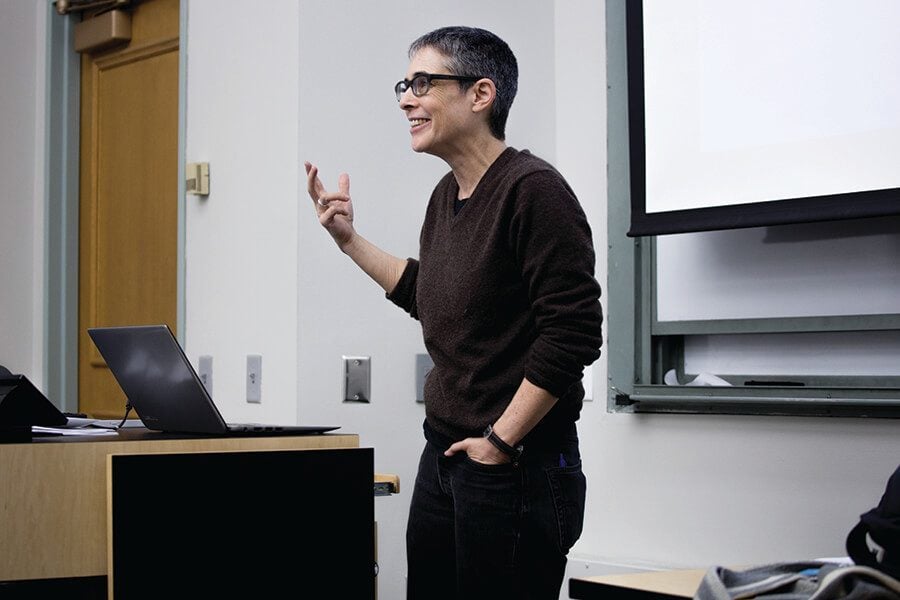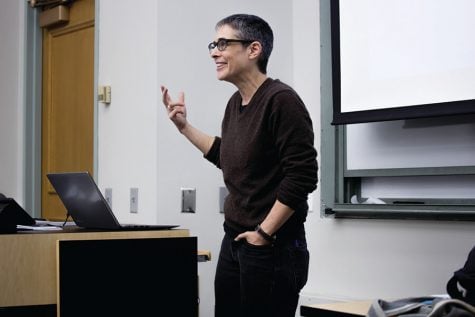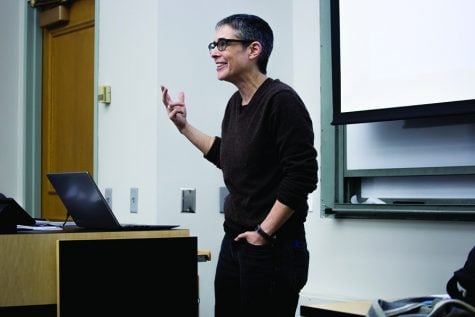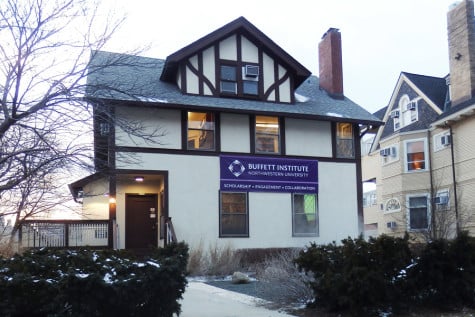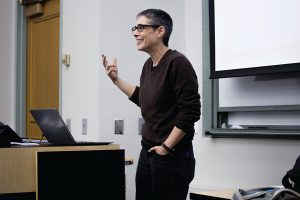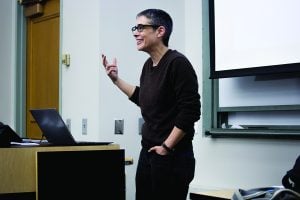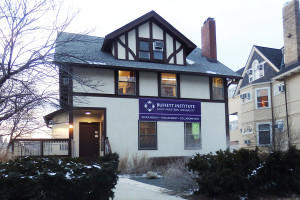Faculty Senate committee finds it ‘impossible’ to act on Prof. Jacqueline Stevens’ appeal of involuntary leave
Daily file photo by Zack Laurence
Political science Prof. Jacqueline Stevens speaks at a campus event last winter. A Faculty Senate committee ruled last month that it could not make a decision on Stevens’ appeal of her involuntary leave.
October 13, 2016
A Faculty Senate committee tasked with reviewing disciplinary actions decided it is unable to make a decision on political science Prof. Jacqueline Stevens’ appeal of her involuntary leave, according to a letter from the committee obtained by The Daily.
The Committee on Cause, chaired by School of Law Prof. Ronald Allen, issued the statement dated Sept. 26, saying it is “impossible” for the committee to act without a statement of specific disciplinary actions against Stevens and that it does not consider sanctions after they are lifted. In a blog post published Oct. 7, Stevens made multiple objections to the committee’s rationale, saying she would appeal the decision.
Stevens was notified by Weinberg Dean Adrian Randolph at the end of July that she was being put on leave based on reports that she was a threat to campus safety, claims that Stevens maintains are baseless. She attributes the University’s action in part to her political activism, including organizing the opposition to former ambassador Karl Eikenberry’s appointment to lead the Buffett Institute of Global Studies. Stevens was ultimately prohibited from visiting campus or contacting students — except those on a list for specific purposes of communication — until a fitness-for-duty evaluation resulted in her being cleared to return to teach this fall.
The committee was notified on Sept. 16 that Stevens had put forth an appeal of disciplinary action, the letter said.
“Professor Stevens may very well have been mistreated in numerous small and not-so-small ways; perhaps there is a hostile workplace environment actionable under law; but the Committee on Cause is not an appropriate forum to air such diffuse and wide-ranging disagreements,” the letter said.
Allen, chair of the committee, did not respond to requests for comment.
Stevens objected to the committee’s assertion that neither she nor the administration provided a “succinct list” of actions taken, releasing on her blog an email from her lawyer — dated Sept. 20 and sent to the committee — that included a discrete list of items Stevens wished to appeal.
Stevens told The Daily she appealed the administration’s action placing her on involuntary medical leave, objecting to the time it took to set up the required psychiatric evaluation that could clear her to return as well as the time it took to initiate the ban in the first place after colleagues took issue with her behavior. Stevens also said she sought to appeal the prohibition of contact with students and disruption of her work, citing interactions with colleagues that she called “abusive,” according to the letter.
The Faculty Handbook requires the administration notify faculty on the specific charges being put forth, as well as provide factual evidence and a particular policy breach. The committee noted that it was given no statement meeting those guidelines but concluded a “disciplinary action has not been taken.” Stevens countered in her post that the administration can explain away actions against professors by calling them non-disciplinary.
Randolph’s letter to Stevens clearing her to return to campus, which Stevens made public on her blog, noted that Stevens may be subject to further disciplinary actions based on what he called “aggressive interactions” with colleagues — reports which Stevens maintains are without foundation.
Randolph said in an email to The Daily last month that the University will not be making public statements on the issue surrounding Prof. Stevens “out of respect for due process and to protect the privacy of those involved.” University spokesman Al Cubbage declined to comment for this story.
The committee noted that the University’s action toward Stevens was done with reference to the Medical Leave/Fitness-for-Duty section of the Faculty Handbook, under which the letter said “the Committee on Cause has no warrant to review actions taken.”
However, the Faculty Handbook reads, “If the faculty member declines to take a voluntary medical leave, the University may place the faculty member on involuntary medical leave. Such an involuntary leave is considered a temporary suspension and is subject to review by the Committee on Cause.”
In response to that specific section of the handbook, Faculty Senate President Laurie Zoloth said in an email to The Daily that the committee met and reviewed the case, and its “report is confidential to protect involved faculty.”
“The role of the committee is not to evaluate medical leave, but to assure a fair review process of sanctions that are placed on a faculty member,” Zoloth said in an earlier email to The Daily.
The letter to Stevens points out that the committee, an advisory body, does not review sanctions after they are lifted, noting that Stevens’ prohibition of contact with students was “ameliorated almost immediately.” However, Stevens said she could only contact certain students about particular issues over email, noting that the list was subject to Randolph’s approval and he had to be attached to all emails. During the duration of her campus ban, Stevens said she could not meet with students in person or communicate by phone or by mail.
Stevens also noted that the committee did not respond to her appeal request in August, while she was still on involuntary leave. If the committee considered her case then, it would not be “after the fact,” as the letter states. In an email to The Daily in early September, Zoloth said the committee is always prepared to be called into action. Zoloth and Allen did not respond to questions about Stevens’ arguments against the committee’s rationale.
Additionally, Stevens wrote in her blog that the committee “inexplicably and irresponsibly ignores” the department’s withholding of her portion of Farrell Funds intended to be distributed to undergraduate researchers. The letter mentions the allocation of research funds as one of the “complained about matters,” but does not consider it a “minor sanction” as described in the Faculty Handbook. Stevens said she categorizes the removal of funds as a “major sanction,” which the committee can consider, according to the handbook. Stevens said she had appealed the removal of these funds in the spring but the committee did not act.
The committee made a note in the letter that the decision “neither condones nor condemns any person or action” involved in the issue.
Prof. Sara Monoson, chair of the political science department, did not respond to a request for comment.
Email: [email protected]
Twitter: @juliarebeccaj
